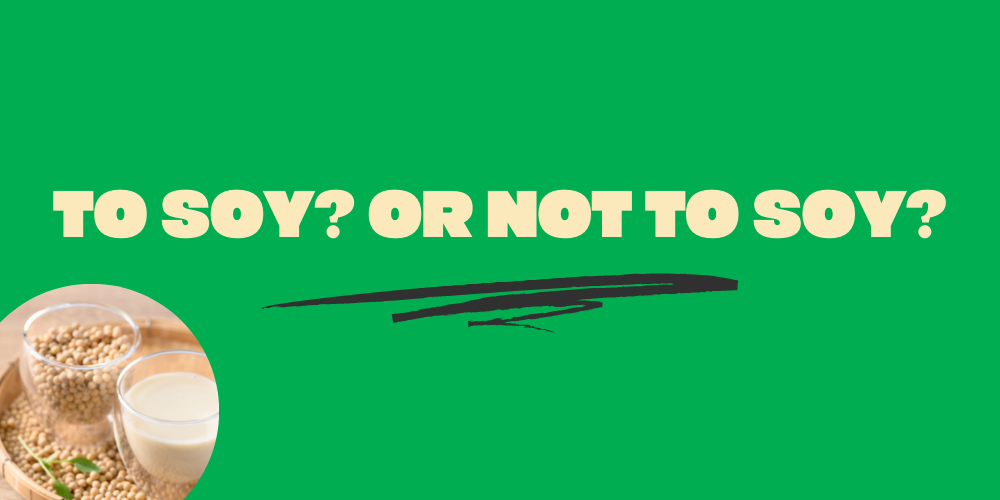KOJA Blog
Soy certainly is a complex topic! There are literally thousands of articles and studies available on soy, but it still remains a controversial subject. Many people believe that it’s healthy for them, while others think it’s detrimental to their bodies and overall health and wellness. Some information that has been provided to the public is misleading, which can leave you feeling confused and pondering whether you should be eating it or not.
Here at KOJA HQ, we’ve heard mixed messages about soy and were asking ourselves the same question, so we decided to do our own research- and here’s our verdict...
The issue lies in unfermented, processed soy products.
Let’s make the distinction clear- not all forms of soy are created equal. The soybean is a legume, which has been used traditionally in Asia for thousands of years as part of a healthy diet and without adverse health effects. So what’s the difference now, and why are there so many issues involving soy? The answer is in the way it’s prepared and consumed. In Asia, the WHOLE soybean was used and fermented, which eliminates the detrimental substances within it and unlocks its health benefits. It was also eaten in small amounts and used as a condiment, rather than in large quantities and as a staple food, as many people use it now.
Soy became a popular commodity in the Western world in the early 1990’s and was publicised as a new ‘health food’. However, this was just clever marketing that lead to a multi-million dollar industry and infiltration into the processed food market.
The soybean crop is cheap and easy to grow, which is one of the reasons why it’s now being overused as a food additive, and you may not even be aware that you're consuming it! Instead of being used in it’s whole form, as it did traditionally in Asian cultures, soy is often processed and separated into different parts for use in various products, which is neither safe or natural. Unfortunately, over 80% of soy that is produced now is genetically modified. This means it’s been chemically engineered to resist being sprayed with heavy doses of toxic pesticides and herbicides, which is the cause of a whole range of other issues.
NON-FERMENTED SOY
Dr. Kaayla Daniel, the author of ‘The Whole Soy Story’ had this to say about processed soy products:
“Today’s high-tech processing methods not only fail to remove the anti-nutrients and toxins that are naturally present in soybeans but leave toxic and carcinogenic residues created by the high temperatures, high pressure, alkali and acid baths and petroleum solvents."
The concerning fact about non-fermented soy products is that they contain natural toxins, known as ‘anti-nutrients’. Phytoestrogens mimic and sometimes block the naturally occurring oestrogen hormone and have been found to be negatively affect various human tissues. Goitrogens suppress thyroid function, phytates inhibit the absorption of essential minerals, enzyme inhibitors interfere with protein digestion, and hemagluttin causes the clumping together of red blood cells.
RISKS:
The consumption of a diet high in non-fermented has been associated with increasing the risk of the following health issues:
-digestive disorders
-thyroid problems
-weakened immune system
-severe food allergies
-premature puberty and developmental issues in babies, children and adolescents
-birth defects and infant abnormalities
-kidney stones
-reproductive disorders
-increases the risk of stroke
-heart disease
-brain damage
-cancer
Be aware of:
It’s best to avoid these products with “soy” in their title, as they are made from processed, unfermented soy: soy milk, isolated soy protein powder, soy burgers, soy ice-cream, soy cheese, soy yoghurt, soybean oil, some breads, some tinned tunas, and unfortunately, it’s also in some infant formulas, which can be highly damaging to a baby’s health.
When purchasing any other processed food product, channel your inner detective and read the packaging carefully. Soy may be hidden in the ingredients list under different names, so watch out for: ‘textured plant protein’, ‘lecithin’, ‘MSG’, ’soya/soja/yuba’, ‘natural flavour’, ‘vegetable gum’, ‘vegetable broth’, 'vegetable oil’, ‘natural flavour’, and ‘bullion’, just to name a few.
FERMENTED SOY
Health Benefits
The long fermentation process breaks down and reduces the potentially harmful levels of toxic substances in the soybeans, which allows their beneficial properties to become available and be absorbed into to your body. Some fermented soy products you can enjoy include soy sauce (be careful as many companies now make it artificially through a chemical process), tamari, miso, tempeh and natto. Although it uses the whole soybean and is seen as a ‘health food’, tofu is actually not fermented.
Some health benefits associated with fermented soy includes:
-the creation of natural probiotics which help your digestive system
-a rich source of Vitamin K2, which works with Vitamin D to regulate the body’s clotting abilities
-decreased risk of cardiovascular disease
-prevention of osteoporosis
-protection from lung, liver and prostate cancers
-decreased risk of dementia
SO WHAT CAN YOU DO?
Our main suggestion is to purchase fresh, whole foods and prepare meals yourself- that way you know absolutely every ingredient that is going into your meals. If you do want to consume soy we recommend you find products which are fermented (such as tempeh, soy sauce, miso), organic and not genetically modified. Limit your intake of unfermented soy by avoiding processed products and fast foods. It’s really important to read your labels when purchasing processed foods, so check to make sure there’s no hidden nasties. And you’ve heard it all before, but moderation is the key!
We hope that's helped clear up any confusions you may have had about soy!
Heidi x
This post was written with love by our Brand Communications Hero, Heidi Brockmann.



